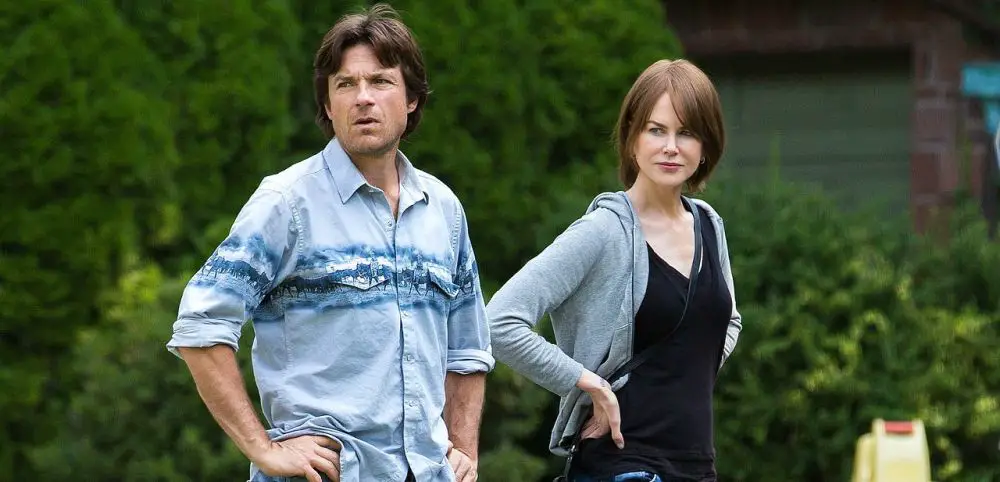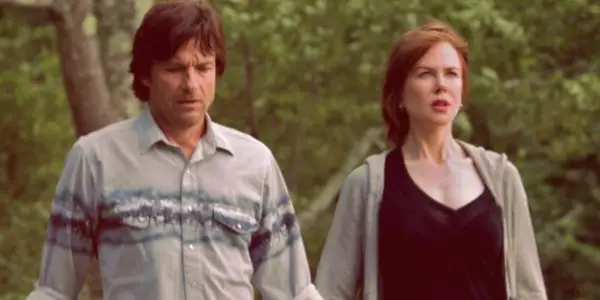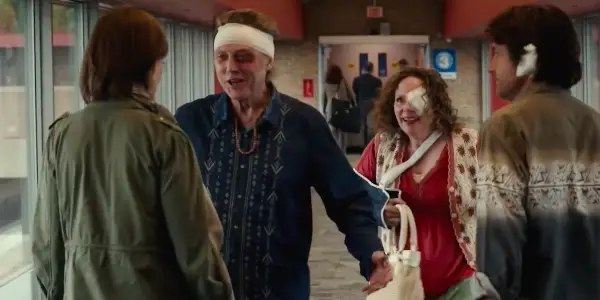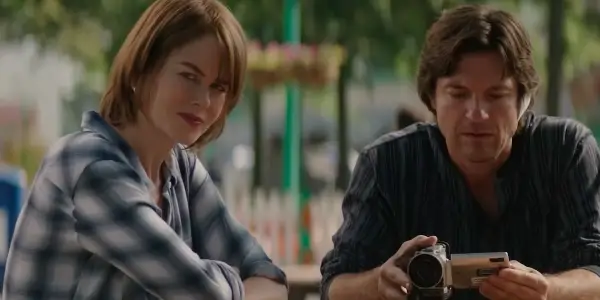THE FAMILY FANG: The Family That Puts The Fun In Dysfunction

Jacqui Blue has a lifetime background in theater and writing.…
What happens when two performance artists grow up, get married and have kids? Their kids become part of their art, of course. This is the story of Caleb and Camille and their two children whom they affectionately dubbed “Child A” (Annie) and “Child B” (Baxter).
Screenwriter David Lindsay-Abaire wrote a deep and meaningful adaptation of Kevin Wilson’s novel, The Family Fang. Actor and director, Jason Bateman along with costars Nicole Kidman, Christopher Walken and Maryann Plunkett, did a great job bringing this story to life. This dark comedy brings together the messed up children of a dysfunctional family, who through all the chaos in their world, still have each other to lean on.
Putting The Fun In Dysfunction
Through out the story we flash back to the young family when the children were still kids, with no choice but to play along with their parents’ antics. It gives great insight into how they were raised and who it turned them into. Annie (Kidman) is a wayward actress with a history of substance abuse problems and has a hard time getting work at present day, while Baxter (Bateman) is a writer with writer’s block and is long past his deadline.
When Baxter is struck in the ear by a potato and is taken out of commission, the hospital calls his parents to come get him. They take him home for some good old-fashioned tender love and care, but the very idea of being with his parents sends him into an anxiety attack that has him calling his big sister to the rescue. With a lot of hesitation and a little coaxing, Annie flies in to join the family fun.

Immediately the parents try to get their old family schtick going again but their adult children aren’t having it. Annie and Baxter’s rebellion against joining in on the scheme creates a new schism in the family dynamic and one that Caleb Fang (Walken) doesn’t react very well to.
Crying Wolf?
When the kids get the call that their parents are missing under grave conditions, Annie is quick to write it off as a game of crying wolf. Still, Baxter’s innocence and curiosity send them down the questioning trail of “what if?”, making Annie determined to prove that her parents are alive and well, thus setting their brother-sister quest into motion.
Are Caleb and Camille just pranking the world with their performance art, or did something actually happen to them but it can’t be taken seriously because of all their past antics? Annie and Baxter’s journey, seeking insight into what their parent’s current plan of action is, takes them back to the past which we see bits and pieces into through-out The Family Fang.

They are led to the very answers they seek, but what they find is not at all what they expected. This family, like all dysfunctional families, takes a twist turn that the audience (those of us unfamiliar with the book, at least) doesn’t expect. The feel-good happy ending we have come to expect at the end of these types of films comes delivered to us in an nontraditional fashion in The Family Fang.
Let’s Get Technical And Go Behind The Screen
Jason Bateman has come to be one of my favorite actors over the last decades. Some of my favorites include his work on Arrested Development, Horrible Bosses and Identity Thief. He’s directed several episodes of several different television series over the span of his lengthy and notable career, and in 2013 directed the feature film Bad Words, but admittedly I’m not very familiar with his work as a director.
I must admit that I tend to be a bit sceptical of actors who go on to direct themselves. The reason being that I know how demanding it is to be a director. There is a lot of work and responsibility that goes into that role. Playing a lead actor in a film requires a lot of focus, discipline and can be full of pressure.
Combining the two roles can sometimes make for a disastrous piece of cinematic art because I don’t believe people are capable of ever fully seeing themselves objectively and that’s how a director needs to see you. Despite this, many actors go on to direct themselves and fail miserably at their attempts. Few are able to do it well. Jason Bateman is one of those few.
The entire cast did a stellar job at portraying their characters, bringing them to life. A young Caleb Fang was portrayed by Jason Butler Harner in the flash back scenes. Christopher Walken, genius as ever, acted the part very well of equal parts grumpy old man and rough-around-the-edges father. In his own way, he does care about his children, but only in the most self-serving of ways.

Maryanne Plunkett plays a believable role of a mother who loves her children but is willing to sacrifice them and her own desires for the man she loves and the performance art that he loves. In the flashback scenes, a young Camille is played by Kathryn Hahn, who is always fun to watch on-screen. Under the layers, I see this character as a wounded woman who gave up her own artistic dreams for the pursuit of love and adventure. Did it pay off in the end or leave her with regret?
Nicole Kidman has a beautiful smile that makes her face light up and can illuminate any scene she’s in, but she also has a cold darkness behind her eyes that can capitalize on the drama of any scene she’s in. Mixed with the innocence of Jason Bateman’s role, the two had a chemistry that played well off each other.
The writing, directing, editing, and score all came together very nicely in this entertaining dark comedy.
A Family That Entertains Together, Stays Together… Or Not
I think one of the most relatable lines came from Caleb Fang. Whether you’re a child or parent, I think most of us can resonate with this statement in some way or another, and perhaps it might shed light on some of the reasons people have behind their child-free choices in life: “If you have kids, you’re going to damage them. That’s what parents do, so what!”
I often wondered what it would be like to have a familial connection with my own brother to heal the wounds of childhood with the one other person who saw and knew my parents in the same light that I’ve seen and known them in when I was very little. That element in this story is played out very strong and allowed me to live vicariously through these characters exploration in healing through their bond. One of the most profound realizations from Baxter in this story is that they cannot fix their parents or their childhood but they can heal and fix themselves.
This is an enjoyable film to watch with genuine characters who have relatable flaws and believable bonds. It is an exaggerated story about one dysfunctional family but is layered with issues that plague many families in different ways and to different degrees. The Family Fang has all the right elements: an interesting story with interesting characters played by a veteran cast bringing their A game to the table.
What is your favorite type of performance art? How do you feel about families who entertain together as a family act? Discuss in comments!
The Family Fang is available on demand now!
Does content like this matter to you?
Become a Member and support film journalism. Unlock access to all of Film Inquiry`s great articles. Join a community of like-minded readers who are passionate about cinema - get access to our private members Network, give back to independent filmmakers, and more.
Jacqui Blue has a lifetime background in theater and writing. After achieving international acclaim with her first film Beautiful Births, she was one of 10 Directors selected by James Franco for his Master Class, "Sex Scenes". She went on to work with Jared Padalecki & T.O.N.E-z in her suicide awareness documentary, I Chose Life: Stories of Suicide & Survival and appears on-screen next to Lou Diamond Phillips in The Last Train. www.jacquiblue.net












